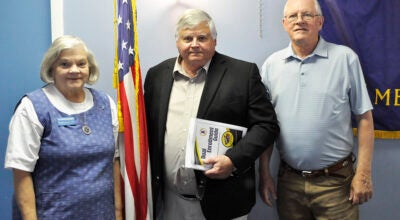Ala. lawmakers not sure gas tax is a good idea
Published 6:11 pm Wednesday, February 20, 2013
By Gabrielle Pack, Troy University journalism student
Pike County’s progression into repairing and maintaining county roads and bridges is at a standstill with funds from a 5-cents gas tax, pending Pike County moving forward and the backing of Sen. Bryan Taylor and Rep. Alan Boothe.
Taylor said he felt positive about the $9 million secured through Alabama Transportation and Rehabilitation Improvement program for Pike County’s roads and bridges.
“This is nine times the amount the proposed gas tax is supposed to generate in a year. I am not sure if raising the gas tax is the answer,” Taylor said. “The gas tax will have a negative impact on businesses, at this point I am not convinced it would get the results.”
County commissioners have not yet passed a resolution to allow the bill to be introduced, Boothe said.
“I have not been formerly given anything drafted, but the bill has to start in the State House, then the senator and I will have to be in agreement,” Boothe said.
In addition, Boothe said relief came up for the roads and bridges with the ATRIP funds without taxing Pike County Residents.
But many roads and bridges in Pike County don’t qualify for ATRIP funds. That’s why the county is interested in the gas tax – for minor roads that would never qualify.
County Engineer Russell Oliver said the ATRIP program is funded through a federal aid program. There are restrictions to what funds can be used for and the state is limited to using the funds for only major roads and bridges.
“Troy has 730 miles of roadway and only 200 miles of that is major roadway, which is about 1/3 of repairs that can be used with those funds,” Oliver said. The commission is trying to solve funding problems each year, but the level of details has not been hashed out.”
Oliver said the county is extremely thankful for Gov. Bentley and his administration and grateful that Pike County is benefiting from the ATRIP money.
But even with ATRIP funds, Pike County still must match 20 percent of the cost for the roads and bridge repairs, while the federal aid money will fund the other 80 percent.
“There is a lot to think about before the tax increase,” Taylor said. “The resolution must be approved by every governing body in Pike County and advertised in the newspaper for at least four weeks, then the bill can be introduced.”
Taylor said experts told him that the bill will generate about $1 million a year, but raising the gas tax is not in the best interest of Pike County.
The gas tax would not only tax residents of Pike County but those who are passing through Pike County will also catch the increase. Taylor said those driving through could think the price of gas coupled with the tax is a bit high and fill up elsewhere.
“This is not just a Pike County problem, it is a statewide problem and there is no problem greater than any other. Fixing infrastructures in one county is no greater than any other county,” Taylor said. “We are trying our best to come up with statewide solutions, rather than a patchwork of state laws from county to county.”
Troy University journalism student Gabrielle Pack, of Atlanta, wrote this story as part of a project partly funded by the Alabama Press Association Journalism Foundation.





